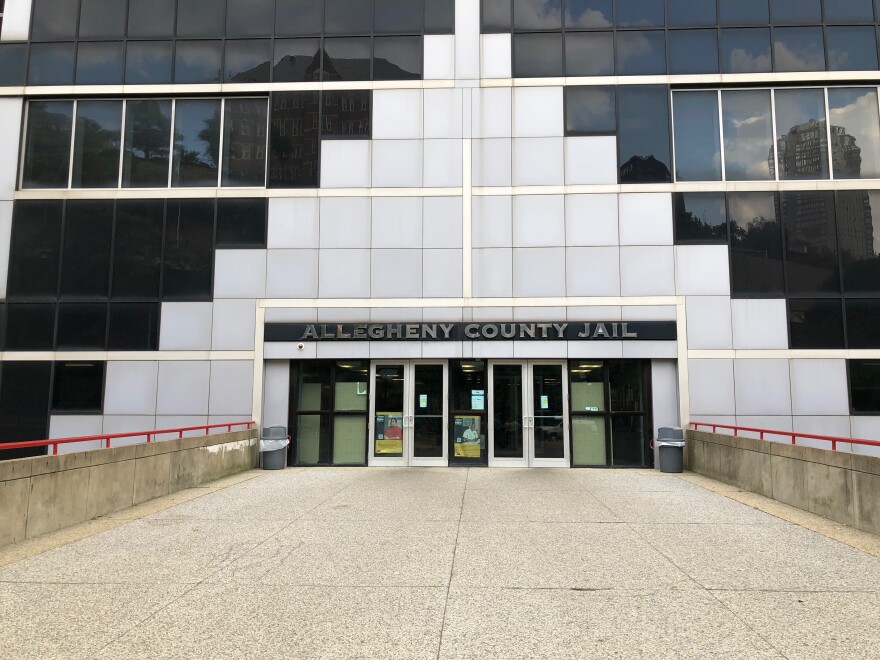Controversial emergency response training at the Allegheny County Jail was the subject of heated debate among members of the jail’s oversight board Thursday. The training has been the subject of legal threats from advocates who claim the contractor who provides it, Corrections-Special Application Unit, focuses too heavily on force.
The board voted four to three to allow the training to continue. In the meantime, jail administrators must answer questions about the contractor and allow board members to view the training.
Warden Orlando Harper repeated earlier claims that the tactics taught by C-SAU meet the demands of a referendum passed this spring. Voters overwhelmingly passed a ban on the use of leg shackles, restraint chairs and certain chemical agents like pepper spray within the facility.
“Our correctional staff are already working in extraordinary circumstances, but a lack of tools and resources will put their safety and well-being in jeopardy,” Harper said.
Harper said that jail staff would adhere to a process that exhausts de-escalation methods before using the C-SAU training. C-SAU's training includes the use rubber projectiles instead of pepper spray.
But oversight board member and Allegheny County Councilor Bethany Hallam had sharp questions about C-SAU and its senior team leader, Joseph Garcia.
Garcia has been the source of controversy elsewhere. The York Daily Record has reported that Garcia uses prisoners in promotional videos and served time in a British prison for conspiracy to commit bodily harm during his service in the Air Force.
Hallam alluded to those reports Thursday, repeatedly asking Garcia about his military service, and at one point asking if he had ever been incarcerated.
Garcia refused to answer questions about his background, referring to those matters as private. He also declined to provide a list to board members of correctional facilities where his training has been implemented.
Harper repeatedly interrupted Hallam’s questions, claiming the jail had done its due diligence in vetting Garcia’s background. When County Controller Chelsa Wagner asked for a list of companies the jail consulted with about Garcia’s training, Harper said he didn’t have the information on hand but would share it with the board “as soon as I can.”
“I don’t think our board should be taking the approach ‘as soon as I can,’” Wagner responded, pressing for a deadline for Harper to submit the details. Harper did not provide one.
But the scrutiny seems likely to continue. The Abolitionist Law Center has already sent a letter threatening a lawsuit against the jail unless it ends the contract with C-SAU.
“Garcia’s trainings ... violate correctional standards and federal laws, are the subject of civil litigation and criminal inquiries, and have resulted in serious injuries and the death of incarcerated people,” the letter says.
Garcia was also questioned about his company's work at a South Carolina jail where an inmate died during a cell extraction this past January. A report from the local prosecutor’s office claims Garcia refused to submit training materials during the investigation. A use-of-force analysis describes footage of Garcia’s training as “ridiculous,” and “excessive.”
But Garcia said Thursday neither officer involved in the death of the prisoner was certified by C-SAU trainers, and that the company cooperated with the investigation.
Ultimately, charges were not filed against the corrections officers in the death.
Stephen Pilarski, an Allegheny County deputy manager who served as proxy for County Executive Rich Fitzgerald, proposed continuing the training while investigating C-SAU. He said the company was the only one that taught tactics which didn't run afoul of the county referendum.
“We’ve looked at other contractors," Pilarski said when board members proposed seeking out other training companies. "The other contractors have items we cannot use."
Wagner argued if jail administrators feel they can’t meet the demands of the referendum, they should appeal it.
“I think your appropriate measure is to take that up in the courts, rather than to bring us a sole-source contract of which there are many credible questions,” she said.
The oversight board will hold a special public meeting to further discuss the training, and C-SAU, in the coming weeks. A date has not yet been set.




